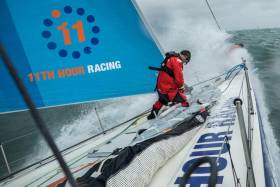Displaying items by tag: Earth Day
On Earth Day (Monday 22 April) The Ocean Race and 11th Hour Racing have forged a partnership that aims to bring sustainability initiatives to the heart of the race.
The Ocean Race says it is building on its position as the sustainability leader in global sport by announcing a visionary partnership with 11th Hour Racing — the largest of its kind in sport.
The legendary round-the-world sailing event and its premier partner will focus on a broad range of initiatives to promote the restoration of ocean health, embedding sustainability in all event operations.
As part of this ‘Racing with Purpose’ initiative, the partners have committed to a comprehensive action plan to initially:
- Convene 11 Ocean Race Summits and Innovation Workshops, focused on ocean health, with the first being held in Europe in September 2019.
- Work with experts and sailing teams to explore the use of state-of-the-art renewable energy systems onboard the IMOCA 60 and VO65 classes during the next edition of The Ocean Race in 2021.
- Inspire school children around the world to take action for the ocean through a multi-lingual, curriculum-based, education programme, to be released in May 2019.
- Continue the powerful science program developed in the last Ocean Race, which gathered critical oceanographic and microplastics data, and examine ways that all teams are able to participate in this groundbreaking research.
- Inspire millions of Race Village visitors with the possibility of a sustainable world through interactive experiences at each stopover.
Johan Salen, managing director of The Ocean Race, said: “Through this partnership with 11th Hour Racing, and by harnessing the power of sport, we are using our collective global influence and extensive networks to reach millions of people to affect meaningful, long-term change for ocean health.
“The sailing community has a deep connection with the sea so it’s natural that we would work together to safeguard its future. The integration of our collective vision within every area of our operations will engage and inspire the wider sailing community, teams, our stakeholders and suppliers, future host cities, schoolchildren and, of course, the race fans to take decisive action on this urgent issue.”
11th Hour Racing says it works with the sailing community and maritime industries to advance solutions that protect and restore the health of our oceans.
The renewed and expanded partnership is intended to build on the momentum of the multi-award winning Sustainability Programme, featured in the past edition of the race, of which 11th Hour Racing was the founding principal partner.
“11th Hour Racing has developed an impact-driven model with sustainability at the core of all of its programs,” said Wendy Schmidt, co-founder of 11th Hour Racing and president of The Schmidt Family Foundation.
“During the last edition of this iconic race around the planet, we raised visibility with the race crews, fans and students all over the world about the breadth of issues threatening the oceans and innovative solutions to address them, some that we already can put into practice. These efforts were a powerful catalyst for positive action.
‘This is a unique opportunity to create a coalition between sport, business, and policymakers.’
"Together, we have the power to deliver science and sustainability through the platform of sport. 11th Hour Racing is excited to continue its collaboration with The Ocean Race to create one of the most forward thinking and unique sport sponsorships of our time.”
The Ocean Race Summits aim to provide a platform that uses a mix of storytelling and groundbreaking announcements to help advance solutions to environmental issues. Industry-led Innovation Workshops will explore ways to evolve business models and reduce impact on the environment.
Growing the Learning Programme, used during the previous race by more than 110,000 children in 41 countries, a new science and sailing module will be launched this spring. This will provide the next generation with the tools to become future ocean advocates.





























































